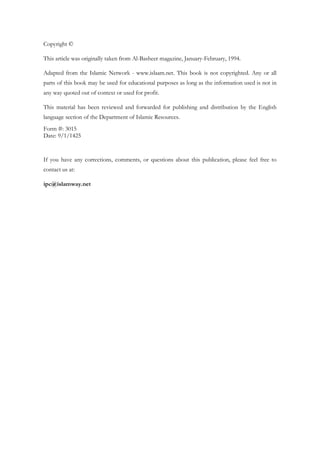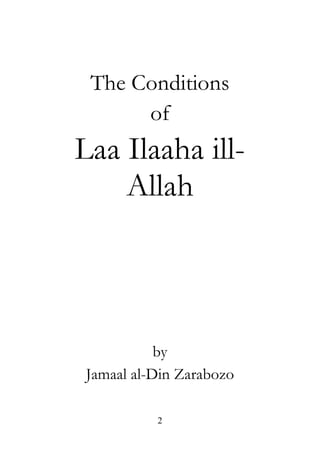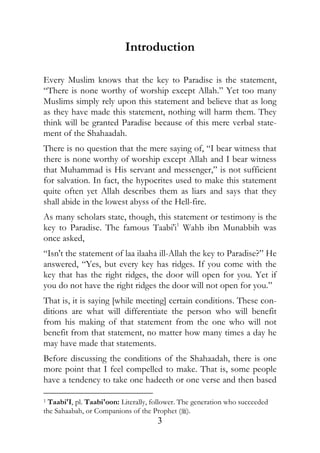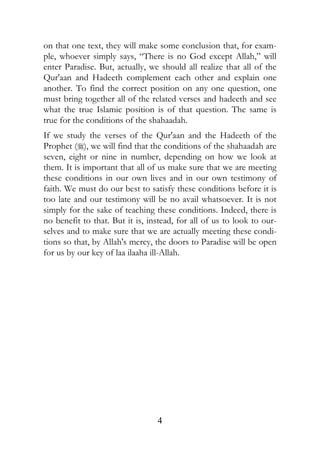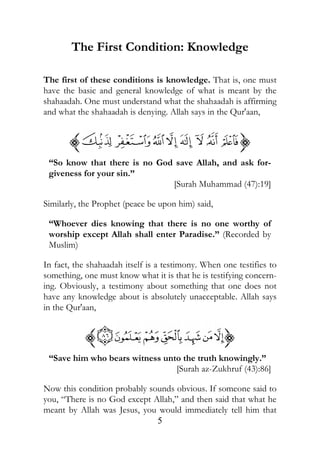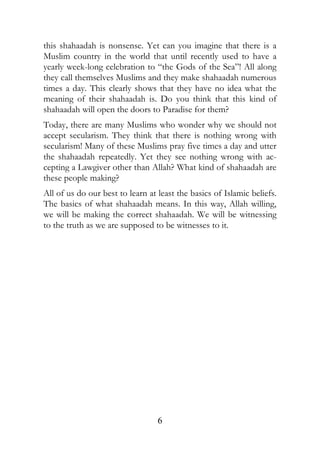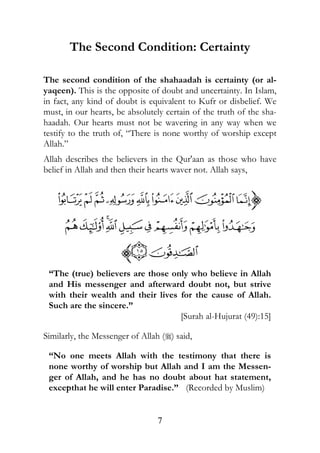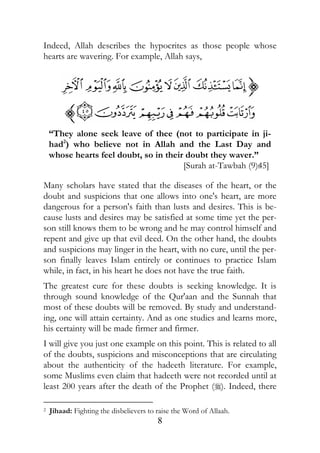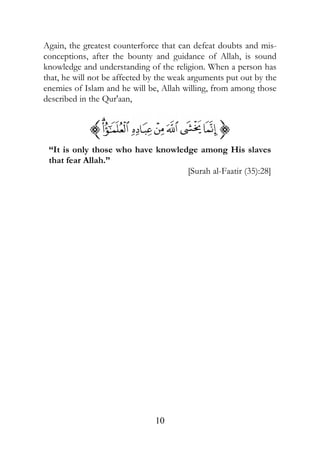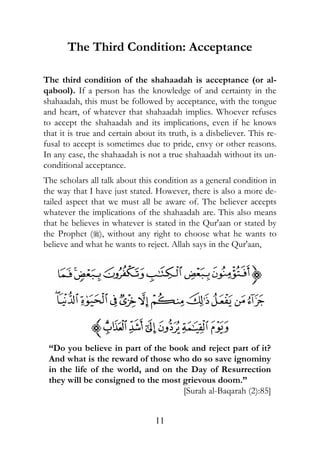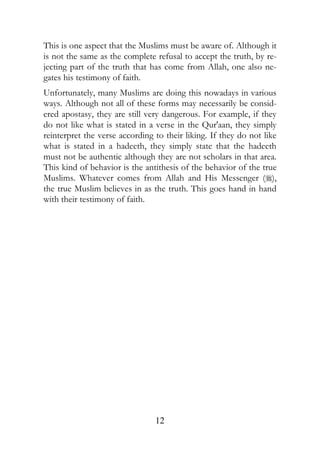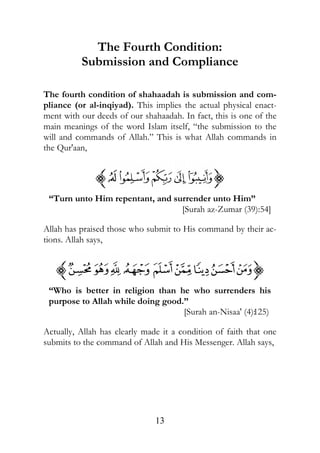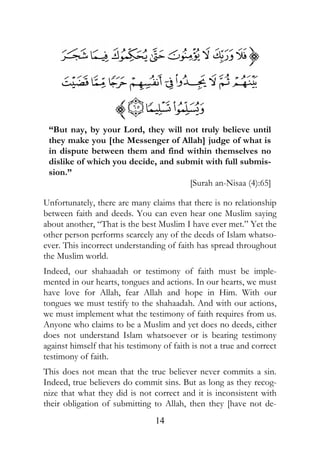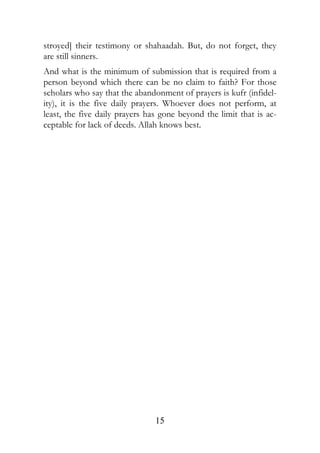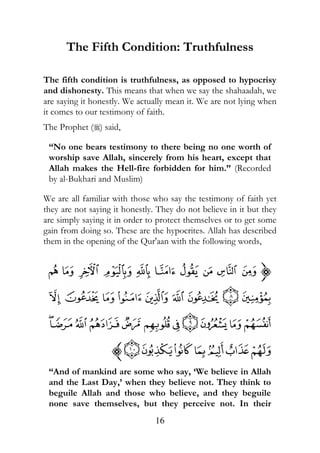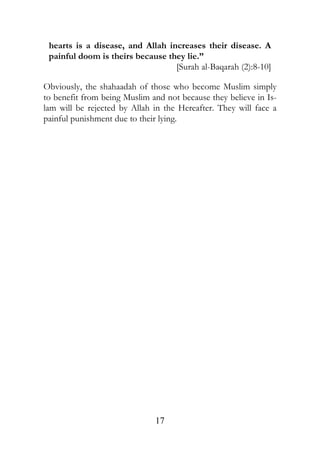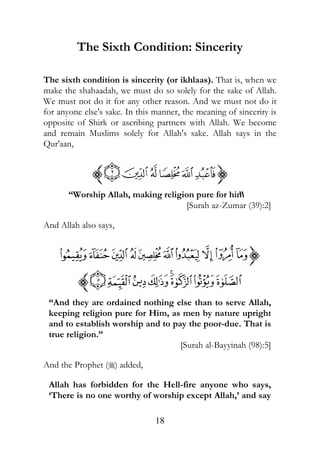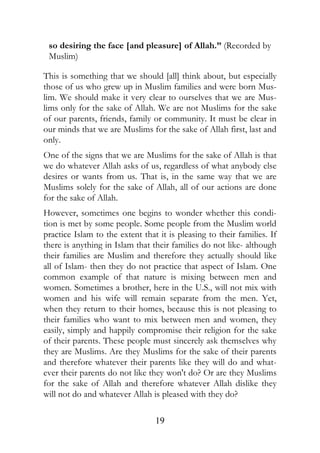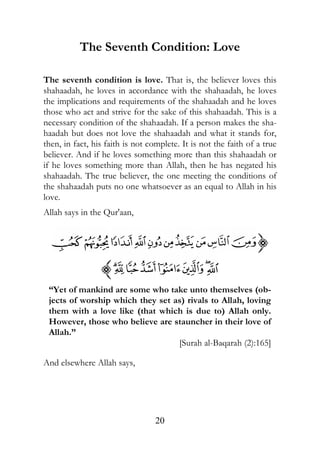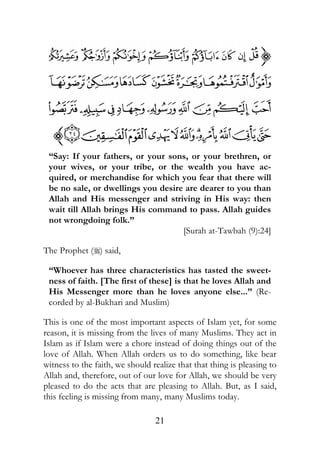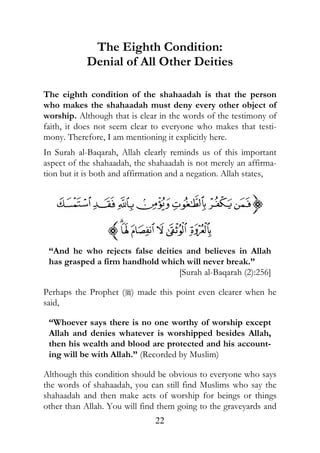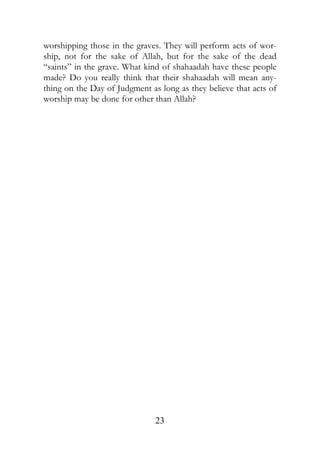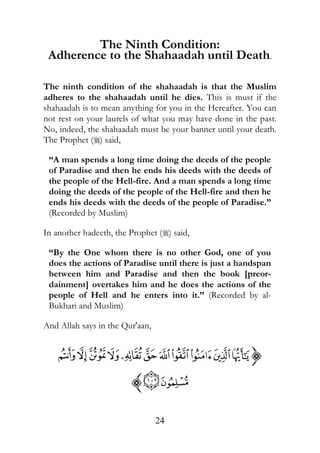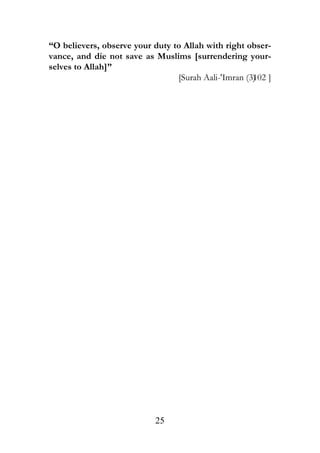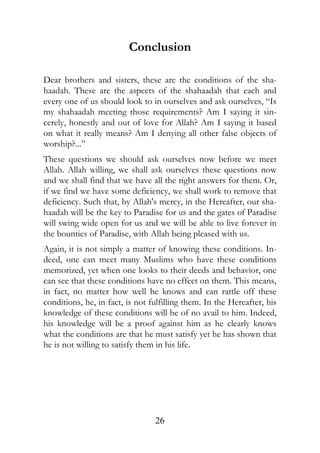En conditions of laa ilaaha ill-allah
- 1. !!# $ $ % # # #
- 2. $# $ $ $ ' $ ( $ #
- 3. )$ $ $$ $ $ * + % , # -. /0 1 + . !2 2 31 % ) ' .
- 5. $ 4 % + 5
- 6. *) 6 7$ 8
- 8. $ 7$ ) ;$#
- 9. ' 8% ( $ % 6$ ) $ 9 ) # % $ ' $ $ $ # 7$ #
- 10. = 6 $ 8% = 7$ ?9 $ 8: ) $ # % $ $ # : $ ) $ $ #9
- 11. @ A $ #
- 12. $ $ $ ) $ # $ $ ;$ % $ #
- 13. ) $ $ ) $ $ #
- 14. 4 #
- 15. $$ ; 7 BC#
- 16. ( ( ) 8
- 17. D$ ( 9 7$ # $ E= $ $ $ ( #
- 18. $ ' $ ) $ $ $ % ' #
- 19. $ $# % $ ) E= $ $ 7 BC $ $ $ ) $$ # % $ ) $ # $ $ $ ) )# % $ # %$$ # $ ) $ $ = $ 7$ #
- 20. ) $ $ $# F $ $ $ $ $ $# E= !
- 21. # $%
- 22. #
- 23. ' @; 6$ BGC. !A ; 7 B C $ ( #
- 24. ) $
- 25. * ' B,$$ 6 C % $ # # F) $ ) $ # E= !#
- 27. D$ ( 9 $ $ $ $
- 28. $ # : 6 $ $ ) 8 D$ ;9J ) 6 $ $ $#
- 29. ) $ $ # + $ $ $ 7$ ?
- 30. $ 6 $ $ #
- 31. J 6 6 ) $ $ $ $# : 4) ? $ $ ? $ % #
- 32. $ # % $# $ #
- 33. !
- 34. + ,
- 35. -
- 36. $ $ # % % $ $ ') K $ # $# F ) 8
- 37. ( #9 $ ) E= ) $ ) # + - #
- 38. #
- 39. $
- 40. .
- 41. % #
- 42. # $ !
- 43. ' @; L B!C. 1A ; 6 BC $ /
- 44. $
- 45. $
- 46. 0
- 47. $%
- 48. % )
- 49. * ' B,$$ 6 C
- 50. %$$ $ )# (
- 51. # +
- 52. 1 2- #
- 53. $
- 54. 3 4
- 55. %
- 56. # ' @;
- 57. B!C.1A 6 ) $ $ $ $ = $ = $ $ #
- 58. $ $ $ $ $ $ ) ) $$# F $ $ $ ) % % $ ) #
- 59. $ $# % $ $ E= $ ; $ )$# $ $ $ $ # $ $ $ $ $ # % ) L ( #
- 60. $ $ $ $ # ( 6 ) $ $$ 300 $ 7 BC# %$$ 3 5 $ ) $ #
- 61. 6 ) $ $ $ $ ) ' L $ # $ $ ) $ $ $ $ $ )#
- 62. ; $ 6 $ $ $ $ ) $ # 4 $ # % $$ $ $ ) $ = # + $ ) % % $ # ) 6 $ $ $ $ $ $ $$ % $ $ ) $ $ $ # $ ) 6 $ $ $ $ $ # 6 6 $ $ % F $ $ % $ $ F 8 9# ; $ $ $ $ $ # $ $ $ $ $ # ) $ $ $ $ $ $ $ # $ $ $ $ % #
- 63. $ $ $ $ $ $ $ $ $ $ # $ % $ $ $ E=
- 64. #
- 65. .# $' @; B/1C.3HA
- 66. $
- 67. + ,- % $ $ $ $ $ ) $ # ) $ $ ) $ $ )#
- 69. $ $ % ) L $# ) $ $ #
- 70. ) ) $ #
- 71. ) ) $ E= $ 7 BC ) $ L # E= 4 #
- 72. 1 6 $
- 73. #
- 74. %
- 75. 4 7
- 76. #' @; ' B3C.H1A
- 78. 6 # L # M 6 $ $ ) # $ $ ) $ # ( $ $ ) E= ) $ # % $ $ $ $ #
- 79. $ ) ) 6 # ) $ 6 BC 6 ) #
- 80. $ $ #
- 81. !
- 82. +
- 83. , -
- 84. $$ $# % $ % 8 $ $ #9
- 85. $ E=
- 86. .
- 87. %
- 88. .' @; 5 B/!C.1A $ $ # (
- 89. $
- 90. '@; = BC. 31C $ $ $ $ 6 #
- 91. 8
- 92. % 3%
- 93. #
- 94. 9 0
- 95. $:1
- 96. #
- 97. %
- 98. ' @; BC.I1A M $ $$ # : ) 6 8
- 100. $ $ $ 6 $# %$$ $ $ $ # % ) ) $ # $# $ ' # 6 $ $ $$ $ $ $ % ) $ #
- 101. $ ) ) # %$$ ) $ # $$ $ @) $
- 102. $A $# $ # $ '$ $ ? $ B$ C ) $ # ) $ ) $ $ $$ # #
- 103. %
- 104. $ # # #
- 105. 7 BC $ /
- 106. # $%
- 107. % ) $ .
- 108. ' B,$$ $ 6 C #
- 109. $ ) $ ) $ #
- 110. # $ $ E= $ $
- 111. %;( #
- 112. $
- 113. 34 %
- 114. #
- 115. $
- 116. # %
- 117. # # % #
- 118. %
- 119. $
- 120. $
- 121. ' @; ' B3C.H 0A F) $ 6 6 $ ) % L $ #
- 122. $ #
- 123. !)
- 124. !
- 125. )
- 126. +-
- 127. $ $ # $ # $ $ = # % ; # $ 6 = # E= ($%
- 128. ' @; 5 B/!C.3A $ $
- 129. # $%
- 130. .%
- 131. ' @; B!HC.1A $ 7 BC $$$ $
- 132. .
- 133. % ;
- 134. ) $%
- 135. 9
- 136. :$' B,$$ 6 C
- 137. $ @A 6 $ 6 # $ ) ) 6 # 6 $ # % $ 6 $ # F 6 $ ) $ $ $ #
- 138. 6 $ # ) $ $ # ; 6 $ % ( # % % $ 6 $ $ % $ % # F ( ( $ # ; M#;# ( $ # : ( $ $ #
- 139. ) 6 # 6 $ ) $ $ ) $ = $? F 6 $ ) $ $ $ ) $ $?
- 140. ! #
- 141. 3# #
- 142. #
- 143. ) ) $ ) $ $ ) $ ' $ $ ) $ ) $#
- 144. $ $# % $ $ ) $ $ $ # % )# $ ) $ ) $ $#
- 145. ) $ $ ) ' )# E= =
- 146. # + 1 -#$%#
- 147. # + -$
- 148. . # % #
- 149. # $' @; ' B3C. I1A $
- 150. ! %
- 151. %
- 152. % # % % # , %
- 153. %
- 154. $
- 155. .
- 156. #
- 157. .
- 158. $
- 159. .
- 160. $
- 161. ' @;
- 162. B!C.3A
- 163. 7 BC $ ( #
- 164. 9 : # $
- 165. .0
- 166. #
- 167. ' B, $$ $ 6 C
- 168. % ) 6 #
- 169. % % $ $ ) # $ $ $ $ ) $ ) $ $ # % $ 6 $#
- 170. 4
- 171. $? 4
- 172. # 1 $ $ ) #
- 173. % ( # % ; ' $ $ $ $ $ # $
- 174. 1
- 175. #
- 176. $
- 177. # ' @; ' B3C.31IA 7 7 BC $ ) $ ( #
- 178. ) $
- 179. # $%
- 180. $' B,$$ 6 C $ $ ) ) $ $ $ 6 $ $ # : $ )$ $
- 181. ) #
- 182. $$ 8 9 )# $ $ ) $? + $ + $ ) $ ?
- 183. /
- 184. $
- 185. !
- 186. 4 #
- 187. 0
- 188. $ # : ) $ # $$ $ $ #
- 189. 7 BC $ $
- 190. *
- 191. . $
- 192. .
- 193. * ' B,$$ 6 C % $ 7 BC $ 8 ?
- 194. %
- 195. *
- 196. 1
- 197. *
- 198. 9
- 199. :#
- 200. .
- 201. ' B,$$ $ 6 C $ E=
- 202. ? # % # $ #
- 203. %
- 204. # 0 9
- 205. # $:' @; =% B/C 03 A
- 206. + $ $ $#
- 207. $ $ ) $ ) $ ) 8% $ ' ? % $ ) ? % $ ? % $ L ?###9
- 208. ' $ ) # ) ' $ $ ) # F $ ) $ ) $# ; = $ 7$ $ 7$ $ $ ) ) 7$ $ # $ # % $$ 6 ) $ $ $$ $ ) $ ) #
- 209. $ $ # % $ $ ) # %$$ $ $ #

